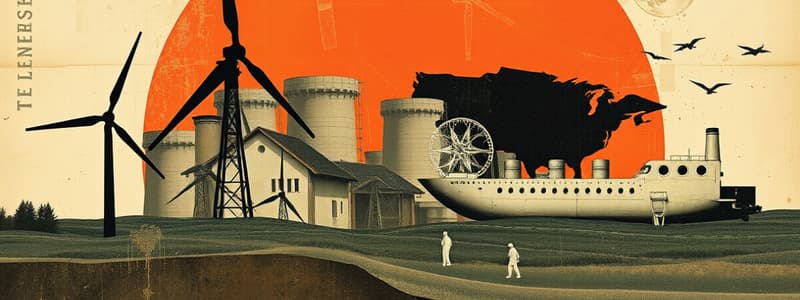Podcast
Questions and Answers
How is mechanical energy generated from wind energy?
How is mechanical energy generated from wind energy?
By converting the kinetic energy of moving air through turbines.
List two significant environmental advantages of hydropower.
List two significant environmental advantages of hydropower.
It is renewable and reduces greenhouse gas emissions.
In brief, define solar energy.
In brief, define solar energy.
Energy obtained from the Sun.
What constitutes biomass energy?
What constitutes biomass energy?
Explain two benefits of utilizing biomass as an energy source.
Explain two benefits of utilizing biomass as an energy source.
What mechanism causes the flow of heat energy?
What mechanism causes the flow of heat energy?
Identify two key advantages of geothermal energy.
Identify two key advantages of geothermal energy.
How does tidal energy produce power?
How does tidal energy produce power?
What defines hydropower?
What defines hydropower?
Why is nuclear energy often classified as non-renewable?
Why is nuclear energy often classified as non-renewable?
Study Notes
Wind Energy
- Generates power by converting kinetic energy of moving air into mechanical energy using turbines.
Hydropower
- Energy derived from the movement of water, supplied by rivers or dams.
- Benefits include being renewable and reducing greenhouse gas emissions.
- Major disadvantage: interferes with aquatic ecosystems.
Solar Energy
- Energy sourced from the Sun.
Biomass Energy
- Derived from organic materials used as fuel.
- Benefits include renewable nature and waste reduction.
Heat Energy
- Flows due to differences in temperature, establishing a thermal equilibrium.
Geothermal Energy
- Utilizes heat from the Earth's interior.
- Benefits include high efficiency and low environmental impact.
- Major disadvantage: location-dependent availability.
Tidal/Wave Energy
- Generates power by harnessing the kinetic energy of moving water to drive turbines.
Nuclear Energy
- Energy released through nuclear fission or fusion.
- Considered non-renewable due to reliance on finite uranium resources.
Building Energy Rating (BER)
- Assesses the energy efficiency of buildings.
- The BER rating provides insights into energy consumption and sustainability.
Environmental Benefits of Renewable Energy
- Renewable energy sources reduce greenhouse gas emissions and overall pollution compared to non-renewable sources.
Studying That Suits You
Use AI to generate personalized quizzes and flashcards to suit your learning preferences.
Related Documents
Description
Test your knowledge on various energy sources including wind, hydropower, solar, and geothermal energy. Explore their benefits, disadvantages, and overall impact on the environment. This quiz covers both renewable and non-renewable forms of energy.




